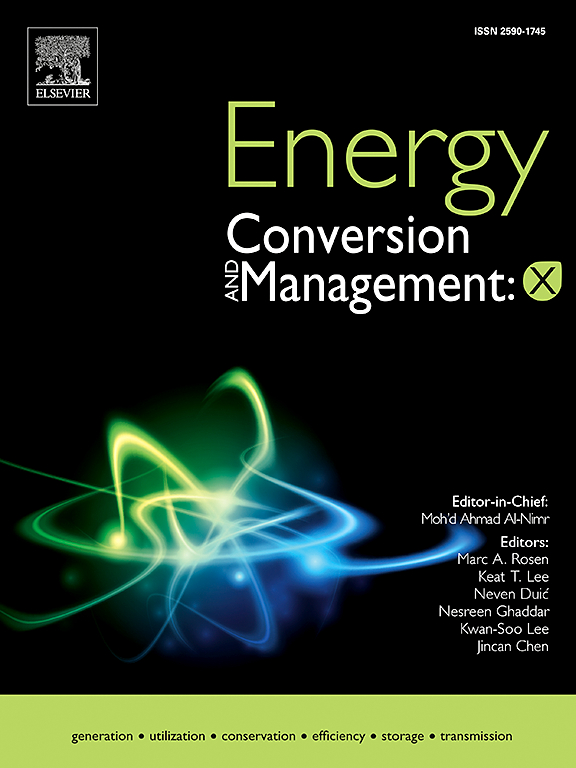在空气光伏/热收集器中使用新型工业化换热板,提高热效率和电效率
IF 7.1
Q1 ENERGY & FUELS
引用次数: 0
摘要
本研究旨在设计一种高效、适用的空气光伏热(PVT)集热器,最大限度地提高电能和热能效率。研究提出了一种可实现工业化的创新型气基 PVT 系统配置,利用工业化热交换器(GRIPMetal 或 GM)作为 PVT 空气通道的吸收板。热交换器由尖顶和空腔组成,以提高空气通道中的传热系数。拟议的热交换板对 PVT 集热器的尺寸和重量影响最小。为确保模拟的准确性,我们使用了与实验结果进行验证的数值模型。研究之后还进行了参数研究,调查热交换器和空气通道的几何效应以及气流速率对 PVT 系统整体性能的影响。研究发现,与平板式 PVT 集热器相比,GM 板的使用大大降低了光伏板的平均温度(最高降低 28 ℃),并提高了空气通道中的对流换热系数,电效率和热效率分别提高了约 164%、16.1% 和 50%。结果表明,拟议的 PVT 集热器能有效补偿 GM 热交换器在低雷诺数时产生的压降和多余的风扇功耗,从而提高整体系统效率。建议的 PVT 系统的最佳配置是采用低气流速率、窄气道和最大尺寸的 GM 尖顶。本文章由计算机程序翻译,如有差异,请以英文原文为准。
Utilizing novel industrialized heat exchanger plate in air-based photovoltaic/thermal collectors to enhance thermal and electrical efficiency
This study aims to design a highly efficient and applicable air-based photovoltaic-thermal (PVT) collector that maximizes both electrical and thermal energy efficiencies. An innovative industrialization-ready configuration of the air-based PVT system is proposed, utilizing an industrialized heat exchanger (GRIPMetal or GM) as the absorber plate for the PVT air channel. The heat exchanger consists of spikes and cavities to enhance the heat transfer coefficient in the air channel. The proposed heat exchanger plate minimally affects the dimensions and weight of the PVT collector. A numerical model, validated against experimental results, is used to ensure the accuracy of the simulation. The study is followed by a parametric study that investigates the geometric effects of the heat exchanger and air channel, as well as the airflow rate, on the overall performance of the PVT system. It is observed that the utilization of GM plates significantly reduces the average PV panel temperature (with a maximum of 28 ℃ reduction) and enhances the convective heat transfer coefficient in the air channel, the electrical and thermal efficiencies by approximately 164%, 16.1%, and 50%, respectively, when compared to a flat plate PVT collector. The results demonstrate that the proposed PVT collector effectively compensates for the pressure drops and excess fan power consumption at low Reynolds numbers due to the GM heat exchanger, resulting in higher overall system efficiency. The optimal configuration for the proposed PVT system is achieved by employing a low airflow rate, a narrow air channel, and GM spikes of the largest size available.
求助全文
通过发布文献求助,成功后即可免费获取论文全文。
去求助
来源期刊

Energy Conversion and Management-X
Multiple-
CiteScore
8.80
自引率
3.20%
发文量
180
审稿时长
58 days
期刊介绍:
Energy Conversion and Management: X is the open access extension of the reputable journal Energy Conversion and Management, serving as a platform for interdisciplinary research on a wide array of critical energy subjects. The journal is dedicated to publishing original contributions and in-depth technical review articles that present groundbreaking research on topics spanning energy generation, utilization, conversion, storage, transmission, conservation, management, and sustainability.
The scope of Energy Conversion and Management: X encompasses various forms of energy, including mechanical, thermal, nuclear, chemical, electromagnetic, magnetic, and electric energy. It addresses all known energy resources, highlighting both conventional sources like fossil fuels and nuclear power, as well as renewable resources such as solar, biomass, hydro, wind, geothermal, and ocean energy.
 求助内容:
求助内容: 应助结果提醒方式:
应助结果提醒方式:


